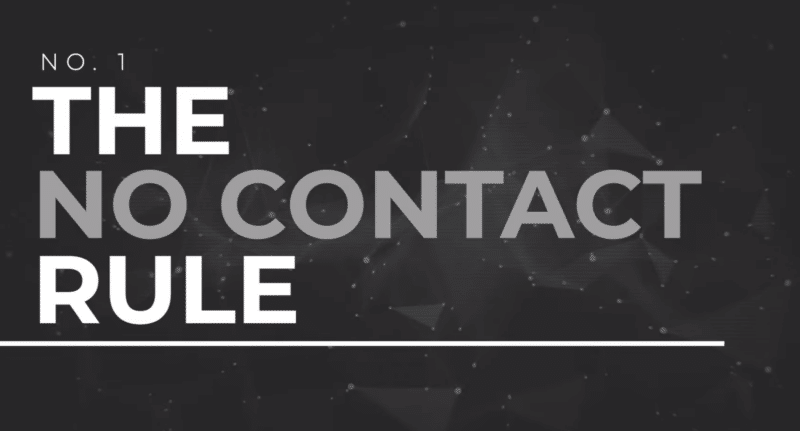Today we’re going to talk about reverse psychology and how it works to get your ex back.
So let’s first define reverse psychology in my way because it might be slightly different from the official definition:
Reverse psychology is making another person do something that you want them to do by telling them not to do it. The theory is that if you tell someone not to do something, they may want to do it more.
Over the years, on my website’s ex-girlfriend recovery and ex-boyfriend recovery, we have been blessed with thousands of success stories – people who have gone through our program and used it to successfully win their exes back.
We’ve learned a lot about what works and what doesn’t work to get exes back through studying these success stories.
That’s why you’ll often come to our website and see that our advice now may be different from the advice we gave 5 years ago.
We see the ex recovery process as a living and breathing thing, so we keep adjusting our perspective and advice according to new information. That way, we’re always giving you the most current advice that truly WORKS to get an ex back.
One thing that has remained unchanged throughout the years that we’ve been doing this is reverse psychology, specifically how it works to get an ex back.

What Are Your Chances of Getting Your Ex Girlfriend Back?
Take the quizFour Highly Effective Ex Recovery Strategies That Utilize Reverse Psychology
So what I’d like to do today is talk to you specifically about our effective strategies that use reverse psychology.
In all, there are four strategies that we still advise today that rely heavily upon reverse psychology to succeed in getting your ex back.
- The no contact rule
- The zeigarnik effect
- Understanding how avoidant attachment styles operate
- Undergoing a paradigm shift
Let’s just dive right in.
Strategy #1: The No Contact Rule
Undoubtedly, the no contact rule is probably the most famous reverse psychology strategy advised by most breakup experts. Our relationship with the no contact rule has changed many times over the years, but ultimately we’ve updated our definition for it two different times.
Initially, it started out as this 30-day rule in which you ignore your ex to try to get them back by making them miss you.
This is classic reverse psychology because not talking to your ex would make them miss you and want to talk to you more. However, when we did more research, we realized that people who are succeeding at getting their exes back aren’t trying to make their exes miss them. That is to say, they don’t enact a no contact rule with the only goal being to make an ex miss them.
The intent behind a no contact rule is infinitely more important than any other factor in its success. Considering our recent findings, here’s how we now define the no contact rule:
The no contact rule is a period of time (generally 30-45 days) where you ignore your ex and focus on yourself and outgrowing your ex. This may have the added benefit of making an ex miss you, but that should not be your intention.
So, where does reverse psychology come into play here? Ultimately by ignoring your ex, you’re tapping into something called reactance.
Reactance relates to behavioral freedoms – people are born with inherent behavioral freedoms, and when you take them away, they have a strong emotional reaction and desire to get them back.
In this case, by doing a no contact rule, you’re taking away your ex’s behavioral freedom of being able to talk to you. This will reasonably make them upset, especially if they reach out to you and don’t get a response back.
They might even react in a way to try to get that freedom back. This could look like calling you immature for ignoring them or trying to hook you into a conversation. On the other hand, it’s also possible that they’ll simply ignore you back and act like they don’t care. Either way, no average person likes to be ignored.
They’re a lot more likely to reach out to you to try to get this freedom back, so reverse psychology definitely comes into play here. However, I don’t want you to think that just by ignoring your ex, all of a sudden, your ex is going to miss you.

What Are Your Chances of Getting Your Ex Girlfriend Back?
Take the quizWe’ve found that your intention and actions of outgrowing your ex matter more because that will help attract your ex back. Reverse psychology will only make them want their freedom to talk to you back, but what’s to stop them from getting bored once they get that?
You need to make them miss you and engage them in meaningful conversations, and that only happens if you have the correct intent during no contact.
Strategy #2: The Zeigarnik Effect
The Zeigarnik effect is one of my favorite strategies ever! It was coined by Russian Psychologist Bluma Zeigarnik and refers to this phenomenon:
People remember interrupted or incomplete tasks better than completed ones
So how does this work? Well, imagine that you’re at your house, and all these things are happening at once:
- A baby is crying inside the house
- Someone’s knocking at your door to get in
- Your phone is ringing
- You notice you left the tap water on, and it’s flooding the kitchen
Sounds overwhelming, right?
Each one of these gives you a grating annoyed feeling, especially that tap on in the kitchen that’s flooding your house. So what’s the first thing you’re doing?
Well, you’re thinking of ways that you can close off these open loops:
- Have to turn off the tap, so your whole house doesn’t flood
- Have to soothe the crying child
- Have to handle the person at the door
- Have to pick up the phone
These are all examples of the Zeigarnik effect because incomplete/pending tasks take higher priority in your brain.
Therefore, when you talk to your ex, the goal is to basically create open loops, interrupted tasks, incomplete questions, so you’re much more likely to make your ex think about you. Now how does this play into reverse psychology?
One of the things that we advise our clients to do is ending conversations at the high point. So you’re having this really great conversation with your ex, things seem to be going extremely well, and then all of a sudden, something happens, and you need to leave. The conversation is interrupted.
This inherently makes them want to talk to you more and more. So ultimately, we use the Zeigarnik effect for two reasons:
It’s a great way to get your ex to start initiating contact with you (to possibly finish unfinished conversations), and
It’s a great way not to overstay your welcome in conversations
Strategy #3: Avoidant Attachment Insight
So this one isn’t technically a strategy involving reverse psychology, but an important understanding to have. Most of our clients have exes with avoidant attachment styles.
This means their ex craves intimacy, but when intimacy comes close, they flee because they’re afraid of it. They’re afraid of it encroaching on their own independence, which they value extremely highly.
Interestingly, when avoidant exes start to retreat into this fleeing state, many people come to me asking how they can make their avoidant ex miss them.
In fact, I recently wrote an entire article and did a YouTube video on this very concept so check those out for more details.
Here’s the main takeaway, though:

What Are Your Chances of Getting Your Ex Girlfriend Back?
Take the quizAvoidant exes will not allow themselves to miss you or have nostalgia until they feel that you have moved on.
So the reverse psychology comes into play here because if you want an avoidant back, you should give them space instead of chasing them. Most people chase after avoidant exes but what actually works is giving them enough time to move on.
You need to try to move on by yourself and seeing that will make them feel comfortable enough to miss you and get nostalgic about your past relationship.
Ultimately we’ve been trying to embed this idea into our strategies for years by telling people that it’s okay to go on dates with other people and flaunt it!
This is super important because it’s the only way avoidant exes will get confirmation that you’re not stuck on them or wanting to get them back. Reverse psychology only really lets them miss you when they think they cannot get you back.
Strategy #4: The Paradigm Shift
In this scenario, a paradigm shift means looking at your breakup in a completely different manner and adjusting your actions accordingly.
We know that most of our clients have anxious attachment styles, so they are obsessed with fixing the relationship they lost.
Frequently this manifests as very needy behaviors like pleading, begging, showing up at their ex’s place unannounced.
Usually, these people get blocked because they overstayed their welcome with their avoidant ex. These people probably had a pattern of neediness throughout their relationship too.
Repeating the same mistakes after the breakup is only going to make things worse.
Albert Einstein once said that the definition of insanity is doing the same thing over and over again and expecting a different result.
So what makes you think you would do well in getting an ex back by continuing to be the same anxious person you were when you broke up?
The solution to this is simple – shift your anxious paradigm from needy to the opposite. Picture how your ex would expect you to react and do the exact opposite.
This is why the no contact rule is so effective. T
he last thing your ex thinks you’re going to do is cut them out of your lives and ignore them completely; hence the paradigm shift has occurred!













